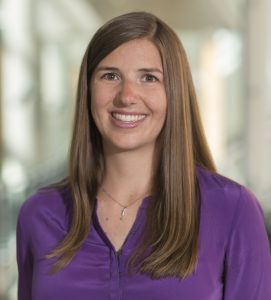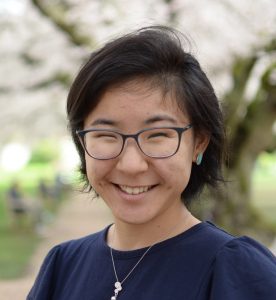 We are proud to announce that Dr. Katherine M. Steele was selected as one of the 2020 DO-IT Trailblazers for her fantastic work in access engineering. Kat has been active in DO-IT, hosting activities where students learn about makerspace accessibility, engineering principles, and universal design. She has also developed resources and published articles with DO-IT staff on topics related to makerspace accessibility and teaching about accessibility in engineering. Please help us in congratulating Kat!
We are proud to announce that Dr. Katherine M. Steele was selected as one of the 2020 DO-IT Trailblazers for her fantastic work in access engineering. Kat has been active in DO-IT, hosting activities where students learn about makerspace accessibility, engineering principles, and universal design. She has also developed resources and published articles with DO-IT staff on topics related to makerspace accessibility and teaching about accessibility in engineering. Please help us in congratulating Kat!
Awards
Congratulations Elijah! Elijah Kuska passes his Ph.D. Qualifying Exam
Momona announced as the winner of the CNT Fernando Family Fund Best Student Paper Award!
 We are proud to announce that Momona Yamagami was selected as the winner of the first annual CNT (Center for Neurotechnology) Fernando Family Fund Best Student Paper award for her paper titled, “Decoding Intent With Control Theory: Comparing Muscle Versus Manual Interface Performance”. The best paper award was selected based on its significance and potential impact, its technical content, the originality of the proposed research, and the clarity of the solutions presented. Congratulations to Momona!
We are proud to announce that Momona Yamagami was selected as the winner of the first annual CNT (Center for Neurotechnology) Fernando Family Fund Best Student Paper award for her paper titled, “Decoding Intent With Control Theory: Comparing Muscle Versus Manual Interface Performance”. The best paper award was selected based on its significance and potential impact, its technical content, the originality of the proposed research, and the clarity of the solutions presented. Congratulations to Momona!
Michael Rosenberg awarded the Gatzert Child Welfare Fellowship
Elijah Kuska named TL1 scholar, 2020 Cohort
We are very proud to announce that Elijah Kuska is part of a cohort of new trainees in the Institute of Translational Health Sciences (ITHS) TL1 Translational Research Training Program. This is a one-year mentored research training program in translational science in a cross-disciplinary community with training, career development, and team science skills.
Project Title: “Analyzing the complex interaction between impaired neuromuscular and musculoskeletal system to determine if gait abnormalities of children with cerebral palsy are advantageous”. Congratulations Elijah!



